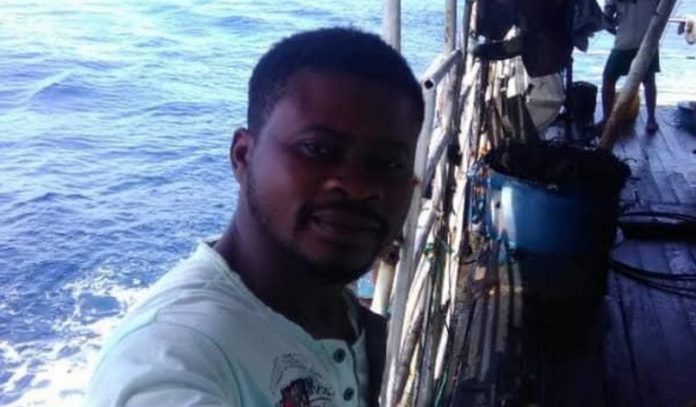
The family of Emmanuel Essien, the missing Ghanaian attached to a Chinese vessel as an Observer, is accusing government and police of failing to help them locate their relative, five months since the case was reported.
“I don’t believe the government and the authorities valued the work my brother was doing,” a worried James, Emmanuel’s elder has told The Guardian.
He added: “If they did, they would attach some seriousness and urgency to the investigation. We know nothing. We don’t understand how it can take so long,”
Emmanuel Essien went missing from the trawler Meng Xin 15 on July 5, 2019.
He was a fishing observer, one of Ghana’s frontline defenders against an overfishing crisis that is among the worst in west Africa. According to The Guardian, Illegal and destructive practices by foreign-owned trawlers are draining the Ghanaian economy of an estimated £50m a year. Along its 350-mile coastline, overfishing has driven small pelagic species known as “people’s fish”, the staple diet, to the verge of collapse.
In 2015, as part of a $55m World Bank project, Ghana placed an observer on every industrial trawler, to collect data and report violations of fisheries law. Around the world, the work of these observers is becoming ever more dangerous. In 2017, a report by Human Rights At Sea found six cases of disappearances of observers in the Pacific. It concluded their work was hampered by “inadequate legal protection” and “physical danger”.
Essien’s diligence made him popular with the Fisheries Commission, according to Bernard. His report on the penultimate vessel he worked on, dated 24 June, ended: “I humbly plead with the police to investigate further.”
But his disappearance on 5 July from a trawler called Meng Xin 15, and the failure of the authorities to find out what happened, has devastated his family and shocked Ghana’s fishing community.
Essien’s younger brother, Bernard, claimed that two weeks before his brother’s disappearance, he had written a statement and addressed it to the Ghanaian police. In that statement, he said, contained an account and accompanying video footage of alleged illegal fishing by a trawler he had been working on.
If the allegation was proved true, the ship’s captain faced a minimum fine of $1 million.
An Observer investigation has found serious allegations of violence, drug-taking and bribery aboard the industrial fleet that trawls this part of west Africa. Interviews with fishermen, observers and sources in the commission suggest criminality is ignored, raising questions over whether the lives of observers are being put at risk.
Essien’s family is no nearer learning the truth. Bernard, a barber, has lost weight and has been having difficulty sleeping since his brother disappeared. They all looked up to Emmanuel, their main breadwinner. Four months on, his daughter, Faustina, six, asks for him constantly, while his son, Takyi, 12, and his four brothers and two sisters wait for answers.
“The little one keeps asking questions,” said James, 34, Emmanuel’s elder brother. “We tell her her father has gone to work and he is not back. My mother keeps calling me, saying: ‘Have you heard from the police? Tell them to bring back my son.’ We are waiting for the results of the investigation. We are all trying to cope.”
An investigation report, which has not been made public, is now with the Attorney-General.
It is taking too long, the family says.
Essien was reported missing on 5 July, after failing to return to the cabin he shared with three Chinese crew – the chief officer, second chief officer and the cook. A police investigation found “no signs of violence or anything incriminating”.
Essien had been threatened, they said, for reporting illegality on trawlers and was about to quit.
“There were days he came back and said he was worried,” said Bernard, 24, the youngest brother. “The job of an observer is to make sure they are obeying the laws. There were times those in charge of the vessel got angry at him for doing that. They told him not to. He told me it was difficult. He wasn’t comfortable. He said it was dangerous work.”
In a hotel in Accra, several trawlermen from Tema, 25km to the east of the city, talked to the Observer, on condition of anonymity. Illegal fishing is common, they said, confirming reports of the targeting of small pelagic fish or “saiko” by trawlers, an illegal trade revealed by the Environmental Justice Foundation this year. Two of them witnessed observers taking bribes, they said. Some had been beaten by the Chinese crew – 90% of the vessels are estimated to be Chinese-owned.
“The observers are there to report bad behaviour,” one fisherman said. “It is like being a spy. When we heard about an observer going missing, we were very unhappy. It is very dangerous.”
It was not easy, the fishermen agreed, for an observer to simply fall overboard. “It would be very hard,” one said. “He is not working on deck like the fishermen.”
James agrees: “I don’t believe my brother threw himself off the boat into the sea. There is no way he would do that. I suspect there was a coordinated attempt to take him off. He was going to write up a report. Perhaps there was a disagreement. Perhaps the Chinese didn’t like it.”
